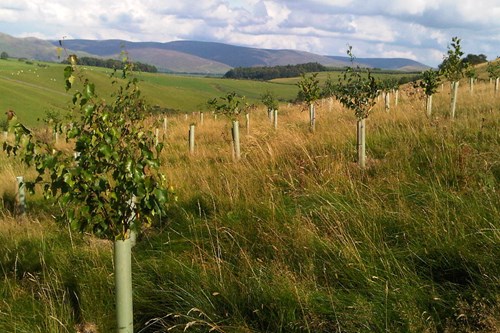Scotland’s Biodiversity Markets

A growing interest in natural capital markets and emerging biodiversity markets has been seen amongst farmers, land agents and the wider agricultural industry. These markets promote direct private investment towards nature restoration and provide a much-needed alternative to publicly funded support.
To effectively address the twin climate and nature crisis, it is estimated by the Intergovernmental Panel on Climate Change (IPCC), that supporting finance will need to increase by three to six times the current finance budget for effective mitigation by 2030. Natural capital markets provide a mechanism for private finance to be steered towards nature recovery and take pressure off the public purse.
Scotland’s National Planning Framework 4 (NPF4) places the twin climate and nature crises at its heart. One of its key aims is to protect biodiversity, reverse biodiversity loss, deliver positive effects from development and strengthen nature networks.
NPF4 Policy 3b states that national and major developments, or those subject to an Environmental Impact Assessment (EIA), will only be supported where it can be shown that they will conserve, restore and enhance biodiversity, so they are in a demonstrably better state than without intervention. The policy requires that such proposals demonstrate significant biodiversity enhancement, in addition to any proposed mitigation.
Biodiversity uplift can be achieved through investing in habitat creation or enhancement either on the site of the development or on other land within the local area of the development.
This private sector investment in biodiversity offers alternative income streams for landowners looking to restore nature on their farms. Westminster’s Nature Markets Framework set a goal for at least £500 million of private investment to flow into nature recovery projects each year by 2027.
NatureScot is keen to establish its own biodiversity metric suitable for Scotland’s planning system as soon as possible, building on the understanding gained from the development of England’s Biodiversity Net Gain (BNG) metric and the experience of practitioners applying its approach in Scotland.
There are a number of progressive and forward-thinking developers, who are voluntarily taking up the BNG mantle in Scotland, including Scottish Hydro Electric Transmission PLC, Scottish Power Energy Networks, CalMac Ferries Ltd, Barratt Homes, and EDF Energy Renewables.
These developers recognise that BNG can be good for business and helps them meet their Corporate Environmental Responsibility. Their uptake of BNG is also driven by the requirement for public and regulated bodies in Scotland to conserve biodiversity whilst undertaking operations. Typical biodiversity enhancement projects have included native woodland creation, peatland restoration, wetland restoration and creation, wildflower meadow creation and hedgerow planting.
Biodiversity enhancement work is not bound to the development site which means that linking up developers with landowners and those in control of natural assets is becoming an important activity. The abundance of semi-natural habitats and ecosystems across Scotland provide significant opportunities for landowners to offer the use of their land to developers to mitigate the impact of their projects.
At the individual farm level this means that a developer may offer a farmer a sum of money to plant a new woodland, restore a pond or establish a wildflower meadow to offset the loss of habitat associated with the construction of a development project.
Our team at SAC Consulting can facilitate partnerships between landowners and private investors, looking to mitigate their environmental impacts. If you would like to understand more about this emerging market or register your interest in a possible partnership, please contact your local SAC Consulting Office.
Fergus Russell, Senior Agricultural Consultant, fergus.russell@sac.co.uk

Unearthed is the exclusive SAC Consulting members' monthly newsletter. Unearthed offers insights and tips from our experts on what we think is in store for farming and crofting in the coming months in order to protect and enhance your business.
Posted by Unearthed News on 16/10/2024
